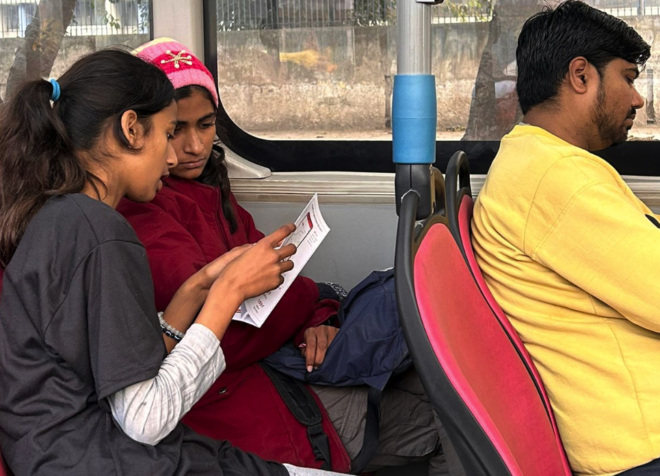A campaign promoting women’s safety and digital accessibility on public transport is underway in India’s capital, New Delhi, carried out by a team from Delhi-based social enterprise, The Urban Catalysts. The campaign, which focuses on safety on e-buses, is part of the ‘Safe and Secure public transport in Delhi’ project, funded by HVT’s T-TRIID programme. The project aims to address gender gaps in transport data collection and analysis to provide evidence which will improve the quality of women’s travel on public transport across India. The project was co-created with the Delhi Government and with their support.
Sexual harassment is prevalent on public transport in Indian cities, but incidents are rarely reported, for reasons including a lack of awareness, the tendency to trivialize sexual harassment as an unavoidable part of the public transport journey, and the belief that such occurrences aren’t serious enough to warrant reporting.
The lack of information about available safety measures and tools further exacerbates women’s feelings of insecurity. The research conducted by The Urban Catalysts found that around 23% of female commuters lack awareness of any helpline to seek help in a distressed situation, and only 10% know the avenues to provide feedback on bus services to the public transport authority. This hinders women’s ability to provide the feedback crucial for highlighting issues and addressing their specific needs.
The Urban Catalysts’s campaign aims to raise awareness among female commuters about safety initiatives implemented specifically on electric buses. Delhi currently has a fleet of 1,650 Ee-buses, the third highest in the world. Their research found that while women generally find Ee-buses to be more comfortable than existing CNG buses, many (69%) still feel unsafe when travelling on them. The absence of real-time information on bus arrival emerged as women’s biggest concern (79%), followed by e-buses not stopping and skipping stops, and a lack of street lighting at bus stops.
Interviews with frontline bus workers revealed that there is a tendency to prioritise travel for paid work, and a belief that women travelling for household chores or recreational purposes are exploiting the free travel scheme. Drivers therefore fail to stop for women if they suspect the women are not travelling for ‘significant’ purposes. These frontline workers also reported observing instances of harassment against women including staring, commenting and touching, but they didn’t view these as serious safety concerns.
In response, The Urban Catalysts’ campaign is designed to make female commuters aware of the existing initiatives like panic buttons inside Ee-buses, helpline numbers and the One Delhi Application, a multimodal journey planning and ticketing app launched by the Delhi Transport Department in 2022. The app addresses multiple service gaps in women’s travel: it provides real-time data on the arrival of buses, thereby reducing women’s waiting and travel times; collects gender-disaggregated data to enable a better understanding of women’s travel patterns on buses and offers a mechanism to provide feedback to the Delhi Government.
Aiming to bridge the gap between the government and female commuters, the team interviewed women about their experiences on public transport and discussed ways in which technology could make them feel safer, demonstrating the use of the One Delhi App to access route details, plan trips and purchase tickets. They found that while 77% of female commuters have access to a smartphone, only 2% were aware of the app’s existence.

The digitalisation of ticketing systems using apps like One Delhi is helpful for female commuters who have access to a smartphones, but may exclude women with limited/no access to smartphones, since they require the use of the internet. The campaign team therefore shared helpline numbers with women without access to a smartphone, enabling them to provide feedback and obtain travel information using a standard phone.
The second prong of the campaign involved a series of workshops at colleges and other institutions targeted at young female commuters. Although most were aware of the One Delhi App, they didn’t know how to navigate through it or understand its uses. The workshop helped them resolve their day-to-day issues to make their travel easier and safer.
In order to reach young commuters in Delhi, the campaigners are also using social media platforms to disseminate information about the app. They have shared a video, in both Hindi and English language, across various channels to demonstrate how to download and navigate it, and to reach a wider audience.
Feedback from women interviewed by the campaigners so far has been overwhelmingly positive, with those new to the One Delhi app stating that, faced with crowded buses, they can now easily buy tickets from their seats without needing to approach the conductor. This is both more convenient and safer for them.

